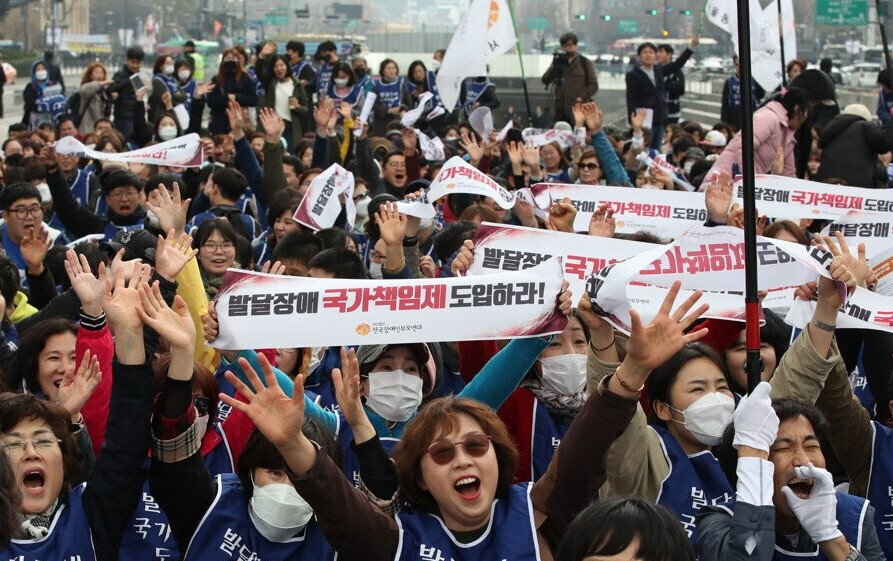hankyoreh
Links to other country sites 다른 나라 사이트 링크
Closure of welfare centers amid COVID-19 pandemic leaves disabled persons without care

With many of Korea’s care programs suspended because of the COVID-19 pandemic, sources say that a Gwangju mother and her developmentally disabled son recently committed suicide together, following a similar incident on Jeju Island this past March.
Sources with the police told the Hankyoreh on June 5 that they were contacted by a passerby who spotted a 59-year-old woman (“A”) and her 24-year-old son (“B”) dead in a car parked on the side of the road in the Imgok neighborhood of Gwangju’s Gwangsan District. The bodies were found around 10 am on June 3.
A note in the car said “I’m sorry, daughter” (A’s daughter lives in Seoul), leading the police to presume that K and her son had decided to end their lives.
After getting divorced a few years ago, A had been living with her son, who has a developmental disability. Until last year, A had been able to leave her son with professional caregivers during the day. But she’d had to take care of N on her own since February, when all welfare centers in Gwangju were closed because of COVID-19.
Feeling unable to take care of her grown son at home, A had him committed to a psychiatric ward in February, where he stayed for about three months. But B had trouble adjusting to life in the ward and lost more than 10kg there. Feeling guilty, K had her son discharged on May 25. Despite her best efforts, she couldn’t locate a decent welfare facility to take care of her son, and she started receiving frequent complaints from her neighbors about the loud noises her son would make. K apparently told her friends about the difficulty of looking after her son.
On Mar. 17, a 49-year-old woman (“C”) and her 18-year-old son, a developmentally disabled high school student, were found dead in their car in Seogwipo, Jeju Island. C had been looking after her son at home after the new semester at his special needs school was delayed and all welfare centers closed down because of the pandemic.
The Gwangju branch of the Korean Parents’ Network for People with Disabilities wrote a petition on the Blue House’s website on June 5 titled, “We hope the president will respond to the death of a developmentally disabled young man and his mother.”
“If developmentally disabled adults are not taken care of by their parents, they end up in psychiatric wards or homeless shelters. Please don’t ignore the parents who are sometimes driven to end their lives and the lives of their children,” the group said in the petition. The group asked the government to provide one-on-one support for daytime activities for people with serious developmental disabilities, expand the hours of daytime care, and develop systems to support families struggling with disabilities and to provide the developmentally disabled with continuing education.
According to the Ministry of Health and Welfare’s 2019 records, 240,000 Koreans were registered as having developmental disabilities (either cognitive disabilities or autism).
By Kim Yong-hee, staff reporter
Please direct comments or questions to [english@hani.co.kr]

Editorial・opinion
![[Correspondent’s column] The real reason the US is worried about Chinese ‘overcapacity’ [Correspondent’s column] The real reason the US is worried about Chinese ‘overcapacity’](https://flexible.img.hani.co.kr/flexible/normal/500/300/imgdb/original/2024/0510/5217153290112576.jpg) [Correspondent’s column] The real reason the US is worried about Chinese ‘overcapacity’
[Correspondent’s column] The real reason the US is worried about Chinese ‘overcapacity’![[Editorial] Yoon’s gesture at communication only highlights his reluctance to change [Editorial] Yoon’s gesture at communication only highlights his reluctance to change](https://flexible.img.hani.co.kr/flexible/normal/500/300/imgdb/original/2024/0510/7717153284590168.jpg) [Editorial] Yoon’s gesture at communication only highlights his reluctance to change
[Editorial] Yoon’s gesture at communication only highlights his reluctance to change- [Editorial] Perilous stakes of Trump’s rhetoric around US troop pullout from Korea
- [Guest essay] Preventing Korean Peninsula from becoming front line of new cold war
- [Column] The state is back — but is it in business?
- [Column] Life on our Trisolaris
- [Editorial] Penalties for airing allegations against Korea’s first lady endanger free press
- [Editorial] Yoon must halt procurement of SM-3 interceptor missiles
- [Guest essay] Maybe Korea’s rapid population decline is an opportunity, not a crisis
- [Column] Can Yoon steer diplomacy with Russia, China back on track?
Most viewed articles
- 1[Correspondent’s column] The real reason the US is worried about Chinese ‘overcapacity’
- 2[Editorial] Yoon’s gesture at communication only highlights his reluctance to change
- 3Yoon rejects calls for special counsel probes into Marine’s death, first lady in long-awaited presse
- 4[Book review] Who said Asians can’t make some good trouble?
- 5With climate lawsuits, youth around the globe are fighting for their future
- 6Nuclear South Korea? The hidden implication of hints at US troop withdrawal
- 7Korea likely to shave off 1 trillion won from Indonesia’s KF-21 contribution price tag
- 8How many more children like Hind Rajab must die by Israel’s hand?
- 9Korea poised to overtake Taiwan as world’s No. 2 chip producer by 2032
- 10Yoon voices ‘trust’ in Japanese counterpart, says alliance with US won’t change